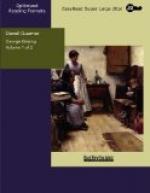The subject was shortly dismissed, and Eustace fell to reporting the remarkable conversation in which he had taken part at the Mayor’s table. His brother was moved to no little mirth, but did not indulge in such savage contemptuousness as distinguished the narrator. William Glazzard viewed the world from a standpoint of philosophic calm; he expected so little of men in general, that disappointment or vexation could rarely befall him.
“These people,” he observed, “think themselves pillars of society, and the best of the joke is, that they really are what they imagine. Without tolerably honest fools, we should fare badly at the hands of those who hate neither wits nor honesty. Let us encourage them, by all means. I see no dawn as yet of the millennium of brains.”
CHAPTER XI
The weather, for this time of year, was unusually bright in Paris. Each morning glistened with hoar-frost; by noon the sky shone blue over clean, dry streets, and gardens which made a season for themselves, leafless, yet defiant of winter’s melancholy. Lilian saw it all with the eyes of a stranger, and often was able to forget her anxiety in the joy of wonderful, new impressions.
One afternoon she was resting in the room at the hotel, whilst Quarrier went about the town on some business or other. A long morning at the Louvre had tired her, and her spirits drooped. In imagination she went back to the days of silence and solitude in London; the memory affected her with something of homesickness, a wish that the past could be restored. The little house by Clapham Common had grown dear to her; in its shelter she had shed many tears, but also had known much happiness: that sense of security which was now lost, the hope that there she might live always, hidden from the world’s inquisitive gaze, justified to her own conscience by love and calm. What now was before her? Not only the elaborate deceit, the perpetual risk, weighed upon her heart; she was summoned to a position such as she had never foreseen, for which she had received no training. When Denzil revealed to her his real standing in the world, spoke laughingly of the wealth he had inherited, and of his political ambitions, her courage failed before the prospect. She had not dared to let him see all her despondency, for his impatient and sanguine temper would have resented it. To please him and satisfy his utmost demands was the one purpose of her life. But the task he had imposed seemed to her, in these hours of faintness, no less than terrible.
He entered, gay as usual, ready with tender words, pet names and diminutives, the “little language” of one who was still a lover. Seeing how things were with her, he sat down to look over an English newspaper. Presently his attention strayed, he fell into reverie.
“Well,” he exclaimed at length, rousing himself, “they have the news by now.”




